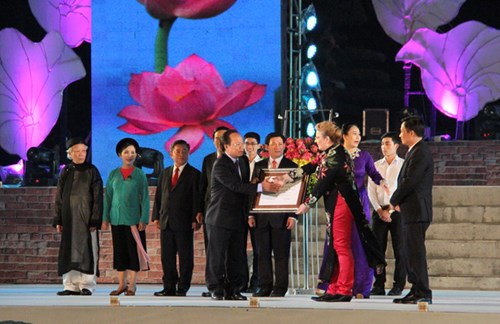A national action programme to preserve and uphold values of Vi-Giam folk singing was launched right after the central provinces of Nghe An and Ha Tinh received the UNESCO certificate honouring the local singing as part of humanity’s intangible cultural heritage on January 31.

The event was attended by National Assembly Chairman Nguyen Sinh Hung, Vice National Assembly Chairpersons Tong Thi Phong and Uong Chu Luu, and Deputy Prime Ministers Nguyen Xuan Phuc and Vu Duc Dam, among others.
Vi-Giam folk singing was officially recognised by UNESCO an intangible cultural heritage of humanity at the 9th session of its Inter-governmental Committee for the Safeguarding of the Intangible Cultural Heritage in Paris on November 27, 2014.
The folk music is a repartee singing while working. There are an estimated 15 tunes of Vi and eight airs of Giam, reflecting the work, cultural life and feelings of the residents in the central coastal provinces.
It is popular in nearly 260 villages across the central provinces of Nghe An and Ha Tinh. The two provinces have 51 singing clubs with over 800 vocalists, many of whom are actively preserving the folk music.
The preservation is currently facing a number of problems since fewer residents sing this genre of music and many of the documentaries relating to the singing were lost.
Speaking at the ceremony in Nghe An’s Vinh city, Chief Representative of the UNESCO Office Katherine Muller Marin said the dossier seeking for the recognition showed that Vi-Giam singing meets all the five criteria of a representative heritage of humanity.
UNESCO hopes that authorities and people of the two neighbouring provinces will develop measures and implement the national action programme so as to further uphold values of Vi-Giam singing, she added.
Deputy PM Vu Duc Dam said Viet Nam looks forward to more cooperation and assistance from international organisations as well as further efforts made by domestic ministries and localities in protecting and promoting the country’s cultural heritage, including Vi-Giam folk singing.
Vi-Giam became the ninth Vietnamese cultural practice winning UNESCO’s intangible heritage status. The eight others are Hue's royal court music, Gong space culture in Tay Nguyen (Central Highlands), the northern province of Bac Ninh's Quan ho (love duet) singing, the Giong festival, Ca Tru ceremonial singing, Xoan singing, Don Ca Tai Tu music, and the worship of Hung Kings.